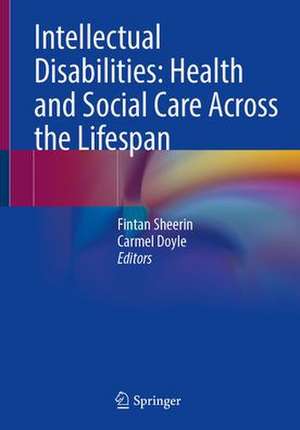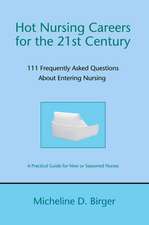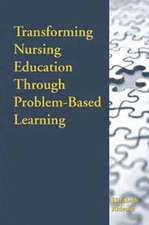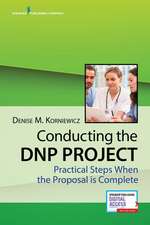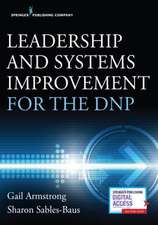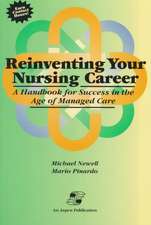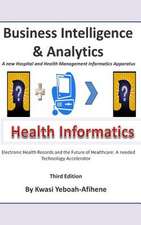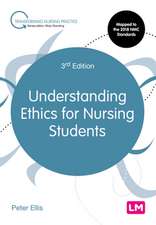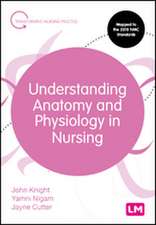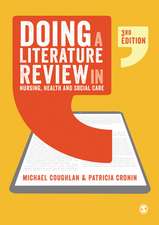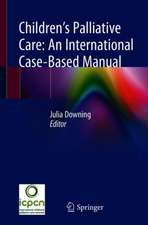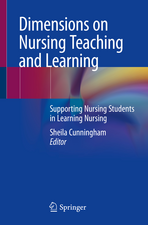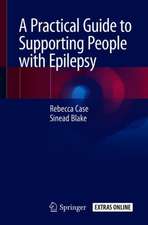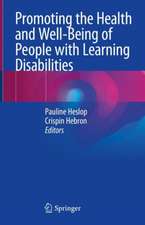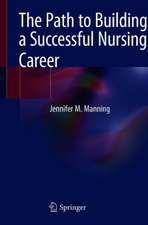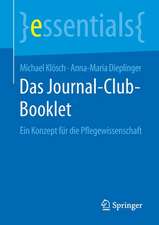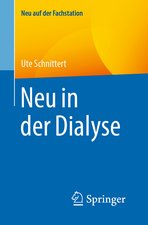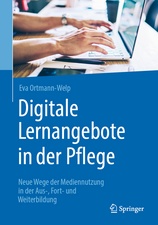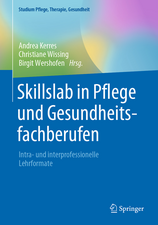Intellectual Disabilities: Health and Social Care Across the Lifespan
Editat de Fintan Sheerin, Carmel Doyleen Limba Engleză Paperback – 20 iun 2023
This textbook provides nurses, allied health and social care professionals with the background knowledge necessary to support individuals with intellectual disabilities and their families. It is a unique and viable resource which is particularly timely, as recent decades have seen a significant change in the demographics and associated care and support needs of this population.
The textbook is laid into four sections to provide a logical structure for the content with chapters developing key topic areas relevant to the field.
The introductory section sets the overall context for the book and considers the importance of developing an understanding of intellectual disability as a core concept identifying philosophies and models of service that underpin health and social care across the lifespan. Communication as a basis for caring and the overall concept of person-centred caring in a multidisciplinary context is considered. The second section explores key concepts from birth to adulthood exploring the nature of intellectual disability, the child with intellectual disability and other related neurodevelopmental conditions. The third section explores adulthood to older age and considers specific health care needs, understanding behaviour and other fundamental concepts including mental health, ageing and palliative care. The fourth and final section explores the integration of health and social care addressing such issues as supporting and enabling families, education, employment, and sexuality and relationships. Edited by experienced and widely respected professionals, this textbook is written by international practitioners, educators and researchers who all play critical roles in working with individuals with intellectual disability and their families.
The textbook is laid into four sections to provide a logical structure for the content with chapters developing key topic areas relevant to the field.
The introductory section sets the overall context for the book and considers the importance of developing an understanding of intellectual disability as a core concept identifying philosophies and models of service that underpin health and social care across the lifespan. Communication as a basis for caring and the overall concept of person-centred caring in a multidisciplinary context is considered. The second section explores key concepts from birth to adulthood exploring the nature of intellectual disability, the child with intellectual disability and other related neurodevelopmental conditions. The third section explores adulthood to older age and considers specific health care needs, understanding behaviour and other fundamental concepts including mental health, ageing and palliative care. The fourth and final section explores the integration of health and social care addressing such issues as supporting and enabling families, education, employment, and sexuality and relationships. Edited by experienced and widely respected professionals, this textbook is written by international practitioners, educators and researchers who all play critical roles in working with individuals with intellectual disability and their families.
Preț: 283.20 lei
Preț vechi: 298.11 lei
-5% Nou
Puncte Express: 425
Preț estimativ în valută:
54.19€ • 56.58$ • 44.75£
54.19€ • 56.58$ • 44.75£
Carte disponibilă
Livrare economică 25 martie-08 aprilie
Livrare express 11-15 martie pentru 30.12 lei
Preluare comenzi: 021 569.72.76
Specificații
ISBN-13: 9783031274954
ISBN-10: 3031274954
Pagini: 254
Ilustrații: X, 254 p. 12 illus., 9 illus. in color.
Dimensiuni: 178 x 254 x 17 mm
Greutate: 0.36 kg
Ediția:1st ed. 2023
Editura: Springer International Publishing
Colecția Springer
Locul publicării:Cham, Switzerland
ISBN-10: 3031274954
Pagini: 254
Ilustrații: X, 254 p. 12 illus., 9 illus. in color.
Dimensiuni: 178 x 254 x 17 mm
Greutate: 0.36 kg
Ediția:1st ed. 2023
Editura: Springer International Publishing
Colecția Springer
Locul publicării:Cham, Switzerland
Cuprins
Introduction.- Section 1. Introduction to Key Concepts.- 1. Foundations of Intellectual Disability.- 2. Communication as a Basis for Person-Centred Support.- 3. Care in a Multi/Interdisciplinary Context.- 4. Attachment, Cognitive Dissonance and Reciprocation in Intellectual Disability Care Provision.- Section 2. From Birth to Adolescence.- 5. The Nature of Intellectual Disability.- 6. Children and Adolescents with Intellectual Disability.- 7. Intellectual and Developmental Disabilities and Rare Diseases.- 8. Other Neurodevelopmental Conditions.- Section 3. From Adulthood to Older Age.- 9. Chronic Health Among Those with Intellectual Disability.- 10. Ageing and Intellectual Disability.- 11. Intellectual Disability, Mental Health and Mental Disorders.- Section 4. Integrating Health and Social Perspectives.- 12. The Social Contract of Care for People with an Intellectual Disability.- 13. Enabling Families to Support Adults with an Intellectual Disability to Live a Life of their Choosing.-14. Social Integration and Inclusion.- 15. Supporting Transitions.- 16. Sexuality, Gender Identity and Relationships.
Notă biografică
Dr Fintan Sheerin, PhD MA BSc PgDipEd RNID RGN RNT FEANS FNI MRSB, is Associate Professor in Intellectual Disability Nursing and Head of the School of Nursing and Midwifery at Trinity College Dublin, where he has taught for 16 years. He worked for more than 20 years across a variety of health and social care settings, as well as with refugees and rural communities in several countries. His research has been informed by these experiences and largely focusses on engagement, rights, mental health and well-being, seeking to address the issues which impact these. His current work is primarily related to supporting the mental health of older people with intellectual disability and is linked to his role as mental health lead for the Intellectual Disability Supplement to the Irish Longitudinal Study on Ageing (IDS-TILDA). He has published widely, spoken at many international conferences, and is co-author of one book, Leadership for Intellectual Disability Service: Motivating Change and Improvement (2019) and contributed to several others. He is a Fellow of the European Academy of Nursing Science and of NANDA International.
Dr Carmel Doyle, PhD MSc BSc PgDip CHSE RNT RNID RCN, is an Assistant Professor in Nursing and currently Head of Intellectual Disability Nursing at Trinity College. Her research and teaching reflects her interest in the areas of intellectual disabilities and children’s nursing. She has clinical experience in both areas and has been in higher education for 18 years. Her specific area of experience is in the care of children with severe and profound intellectual disabilities and complex care needs. She has completed several funded research projects in the field adopting a variety of research methods. She has collaborated with key stakeholders and has developed a strong network with national disability service providers. She has several publications and has also received funding nationally and internationally. She has completed a PhD in the field of ‘giving medicines’ to children with intellectual disability. Her research-based commitments include supervision of students undertaking research to PhD level. She is co- chair of a health service provider research ethics committee, has completed external examiner roles at other Universities and is also an educational consultant for Special Olympics Ireland. She has published internationally and is a co-author of the book Intellectual Disability Nursing: An Oral History Project, Emerald Publishing (2020). As Head of intellectual disability nursing, she leads on developments in the discipline and sector from both education, policy development and research perspectives.
Dr Carmel Doyle, PhD MSc BSc PgDip CHSE RNT RNID RCN, is an Assistant Professor in Nursing and currently Head of Intellectual Disability Nursing at Trinity College. Her research and teaching reflects her interest in the areas of intellectual disabilities and children’s nursing. She has clinical experience in both areas and has been in higher education for 18 years. Her specific area of experience is in the care of children with severe and profound intellectual disabilities and complex care needs. She has completed several funded research projects in the field adopting a variety of research methods. She has collaborated with key stakeholders and has developed a strong network with national disability service providers. She has several publications and has also received funding nationally and internationally. She has completed a PhD in the field of ‘giving medicines’ to children with intellectual disability. Her research-based commitments include supervision of students undertaking research to PhD level. She is co- chair of a health service provider research ethics committee, has completed external examiner roles at other Universities and is also an educational consultant for Special Olympics Ireland. She has published internationally and is a co-author of the book Intellectual Disability Nursing: An Oral History Project, Emerald Publishing (2020). As Head of intellectual disability nursing, she leads on developments in the discipline and sector from both education, policy development and research perspectives.
Textul de pe ultima copertă
This textbook provides nurses, allied health and social care professionals with the background knowledge necessary to support individuals with intellectual disabilities and their families. It is a unique and viable resource which is particularly timely, as recent decades have seen a significant change in the demographics and associated care and support needs of this population.
The textbook is laid into four sections to provide a logical structure for the content with chapters developing key topic areas relevant to the field.
The introductory section sets the overall context for the book and considers the importance of developing an understanding of intellectual disability as a core concept identifying philosophies and models of service that underpin health and social care across the lifespan. Communication as a basis for caring and the overall concept of person-centred caring in a multidisciplinary context is considered. The second section explores key concepts from birth to adulthood exploring the nature of intellectual disability, the child with intellectual disability and other related neurodevelopmental conditions. The third section explores adulthood to older age and considers specific health care needs, understanding behaviour and other fundamental concepts including mental health, ageing and palliative care. The fourth and final section explores the integration of health and social care addressing such issues as supporting and enabling families, education, employment, and sexuality and relationships. Edited by experienced and widely respected professionals, this textbook is written by international practitioners, educators and researchers who all play critical roles in working with individuals with intellectual disability and their families.
The introductory section sets the overall context for the book and considers the importance of developing an understanding of intellectual disability as a core concept identifying philosophies and models of service that underpin health and social care across the lifespan. Communication as a basis for caring and the overall concept of person-centred caring in a multidisciplinary context is considered. The second section explores key concepts from birth to adulthood exploring the nature of intellectual disability, the child with intellectual disability and other related neurodevelopmental conditions. The third section explores adulthood to older age and considers specific health care needs, understanding behaviour and other fundamental concepts including mental health, ageing and palliative care. The fourth and final section explores the integration of health and social care addressing such issues as supporting and enabling families, education, employment, and sexuality and relationships. Edited by experienced and widely respected professionals, this textbook is written by international practitioners, educators and researchers who all play critical roles in working with individuals with intellectual disability and their families.
Caracteristici
Presents an evidence-based material to support for individuals with intellectual disabilities and their families Offers a multidisciplinary and international perspective for nurses, allied health and social care professionals Provides didactic elements: learning outcomes, reader activities, key points and case study vignettes
